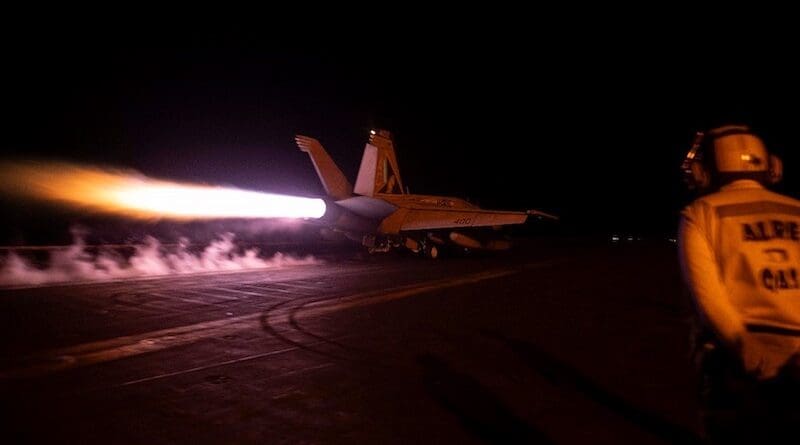Houthis And Crisis Of Coalition Creation In US Foreign Policy – OpEd
As Israel’s military operations in Gaza continue, Yemen’s Houthi rebels have escalated their attacks on Israeli-linked ships in the Red Sea, calling for revenge. This has led to a major disruption of the vital sea trade route, as many shipping and oil companies have halted their transit through the area. The situation has sparked fears of serious global economic repercussions. The United States is attempting to form a new coalition to safeguard the ships sailing in the Red Sea, but this has also increased the military presence in the region. Analysts are worried that this could trigger the spread of the Israeli-Palestinian conflict and hostility to the whole region.
The Houthis have launched over 100 missile and drone strikes on ships in the Red Sea, targeting those linked to Israel or heading there. The US Defense Secretary Lloyd Austin announced a new coalition to protect the sea trade route during his recent Middle East visit. The coalition will include the UK, Bahrain, Canada, France, Italy, Netherlands, Norway, Seychelles, Spain, Greece, and Australia, and will conduct joint patrols in the southern Red Sea and the Gulf of Aden.
The Houthis declared that the US-led coalition in the Red Sea will not deter their attacks on Israeli ships and that the US is only trying to protect Israel and militarize the sea. They claimed their right to support Palestine, as the US supports Israel. The Houthi leader Abdul Malik al-Houthi warned that anyone who escalates the conflict will face the consequences. He said on TV that they will strike US ships and interests in the region with their missiles, drones, and military operations if the US targets Yemeni forces.
Analysts warn that the rising tension in the Red Sea could harm the global trade and supply chain. The Houthis can block the vital Bab al-Mandab strait at the Red Sea’s southern tip, which handles about 12% of the world’s trade. This poses various risks to the shipping industry.
London’s maritime insurers have labeled the south of the Red Sea as a high-risk zone, raising the insurance costs for ships that sail there. Four big container shippers – MSC, Maersk, CMA CGM, and Hapag-Lloyd – have also halted or reduced their Red Sea trips since December 15. These moves will drive up the transportation rates and disrupt the global supply chain of goods, which was recovering from the COVID-19 pandemic.
The US army has sought to form a new coalition in the Red Sea with 11 other countries, claiming to secure the sea trade routes. However, the coalition members are not very committed. Australia, the Netherlands, and Norway have sent only a handful of troops. France and Italy’s warships are not under the US command. Few countries have shown interest in joining the coalition, which hardly deserves the name. But Washington does not admit this and boasts of adding new members and reaching 20 countries.
The Arab countries, especially Saudi Arabia, have avoided joining the coalition, fearing the Houthi retaliation. The US-led naval coalition in the Red Sea could spark the Israeli-Palestinian conflict in this crucial waterway. The US warships backing Israel risk clashing with the Houthi forces. Iran’s backing of Houthis and Palestinians could also worsen the regional situation.
The Red Sea conflict worries the Middle East countries, who depend on the vital shipping routes and fear regional instability. The Yemeni government and regional powers like Saudi Arabia and Egypt are reluctant to join the coalition and face the Houthis. The Houthis’ pro-Palestinian stance makes it hard for countries to oppose them politically. Only Bahrain has joined the US-led Red Sea Defense Coalition, while no other Red Sea country has agreed.
The Western countries and the US allies are also reluctant to join the coalition. Only England has sent a warship under the US command. This is because the US has not earned the trust of its allies. It has failed to counter the Houthis, even though it could do it alone. Yet it asks for warships and soldiers from others. No wonder they are hesitant. The US’s hasty exit from Afghanistan and the bitter experience of the Europeans there also weigh on their minds.
Also, the Europeans think that the coalition is not the answer. They have a simpler way to end the war: a ceasefire in Gaza. The Houthis say that they will stop the Red Sea attacks if the war stops. However, the US does not want a ceasefire and has vetoed all peace efforts. Can you blame the US allies – France, Australia, Spain, Canada, and Norway – for wanting a ceasefire? They think that it will solve the Red Sea problem. The US’s mistake is that it uses a military solution for a political problem.
The Red Sea is at a critical point, where the security of a vital sea route clashes with the Israeli-Palestinian conflict. Washington’s naval coalition may not work well in this chaos, and could even worsen the regional tensions.

